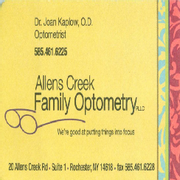
While vision problems can occur all year long, many people experience issues with their eyes once winter arrives. Some of these issues can have very serious outcomes and may even impact your ability to see clearly. The following are a few common problems that can happen over the winter season and what you can do to treat them.
3 Common Winter Vision Problems
1. Snow Blindness
Snow blindness, also called photokeratitis, is a condition that results from excessive UV exposure. Snow can reflect up to 80% of the sun’s rays, which leads to symptoms such as burning, redness, blurriness, headaches, and swelling. The best way to prevent snow blindness is by wearing sunglasses with UV protection outdoors during the winter, especially when skiing or snowboarding.
2. Dry Eyes
 The lack of moisture in the air, both indoors and outdoors, can also dry out your eyes. This is especially heightened if your eyes are naturally dry, which can result in an irritated or gritty feeling. Your eye doctor can offer information on drops to soothe dryness. Also, consider buying a humidifier for your home, which will infuse the air with some much-needed moisture.
The lack of moisture in the air, both indoors and outdoors, can also dry out your eyes. This is especially heightened if your eyes are naturally dry, which can result in an irritated or gritty feeling. Your eye doctor can offer information on drops to soothe dryness. Also, consider buying a humidifier for your home, which will infuse the air with some much-needed moisture.
3. Watery Eyes
Conversely, your lacrimal glands may become overactive due to blustery weather. These glands produce more moisture and tearing when your eyes are exposed to the cold air. As a result, it may seem like your eyes are constantly watering. This can be irritating, especially when participating in an outdoor activity. While sunglasses may help a bit in this case, consider investing in a pair of winter weather goggles for activities such as skiing and snowboarding. Make sure the goggles also have UV protection for maximum coverage.
If you're experiencing vision problems in Rochester, NY, Allens Creek Family Optometry can help to find a solution. Our Optometrists use the latest in eye care technology to diagnose and treat a variety of issues. We offer comprehensive eye exams for adults and kids, which test visual acuity and movement. To schedule an appointment, call (585) 461-6225. You can also visit us online for more information.
About the Business
Have a question? Ask the experts!
Send your question

